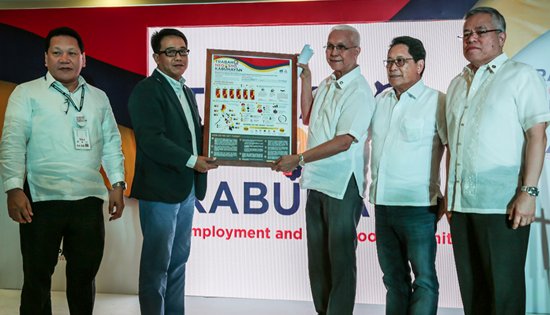|

The
“Trabaho, Negosyo at Kabuhayan: A Blueprint for Decent
Employment and Entrepreneurship 2017-2022” prioritizes decent
job creation, entrepreneurship, creativity and innovation,
formalization and growth of micro, small, and medium-sized
enterprises (MSMEs), youth unemployment reduction, education and
training. |
New gov’t blueprint
for decent employment envisions 7.5 million jobs by 2022
By
DTI-OSEC-PRU
December 2, 2016
TAGUIG CITY – A new
government blueprint for decent job creation through employment and
entrepreneurship from 2017 to 2022 was adopted at the conclusion of
the two-day Trabaho, Negosyo at Kabuhayan (TNK) - Employment and
Livelihood Summit on December 2.
Signed by Secretaries Ramon
Lopez of the Department of Trade and Industry (DTI) and Silvestre
Bello III of the Department of Labor and Employment (DOLE), the
“Trabaho, Negosyo at Kabuhayan: A Blueprint for Decent Employment and
Entrepreneurship 2017-2022” prioritizes decent job creation,
entrepreneurship, creativity and innovation, formalization and growth
of micro, small, and medium-sized enterprises (MSMEs), youth
unemployment reduction, education and training.
“By 2022, we want to achieve
full employment at 5% unemployment rate by creating 7.5 million jobs,
mainly in key employment generating sectors (KEGS) such as
manufacturing including food processing, construction, tourism,
Information Technology-Business Process Management (IT-BPM),
transportation and logistics, and retail trade,” Sec. Lopez said.
The commitment is in line
with the 2030 Agenda for Sustainable Development, particularly Goals 8
and 9, on the provision of decent work and economic growth, and on
building resilient infrastructure, promoting inclusive and sustainable
industrialization and fostering innovation, respectively.
The 2017-2022 livelihood
agenda envisions the transition of informal and economic units to the
formal economy with full respect to fundamental rights and principles
at work. It also reiterates the implementation of the Comprehensive
National Industrial Strategy to upgrade selected industries that
generate employment, integrate manufacturing, agriculture and
services, address supply chain gaps, and deepen industry participation
in global value chains.
The TNK Summit, participated
in by the public and private sectors and some members of the academe
wrapped up policy recommendations from previously held sectoral
summits to chart a new employment agenda, in line with the
administration’s development path.
Sec. Lopez strongly
encouraged Summit participants to invest in the Industry and Services
sector, as well as in the country’s human capital to help address the
perennial problem of skills mismatch and to sustain the growth of
Philippines industries.
Policy recommendations from
sectoral summits on MSME, manufacturing, construction and IT-BPM fed
into the TNK Summit, which carried the theme, “Malasakit at Pagbabago
Tungo sa Kaunlaran at Katiwasayan,” preparing the workforce for the
industry’s current and future needs.